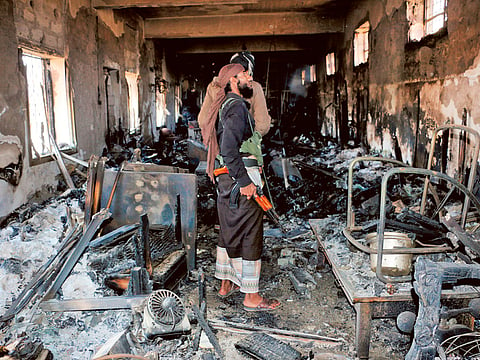Al Houthi shelling destroys rare items inside Taiz national museum
The fire reduced valuable manuscripts to dust, say residents

Al Mukalla: Al Houthis’ intensive shelling of Yemen’s Taiz on Sunday night set a fire inside the national museum burning centuries-old manuscripts, books and weapons on display, residents and officials said on Thursday.
Abdul Nasser Al Siddique, a local photographer who rushed to the museum on Monday, told Gulf News that the fire was sparked after Al Houthis heavily fired anti-aircrafts guns at the museum apparently targeting resistance fighters who were guarding the museum.
“When flames began engulfing the museum, resistance fighters used water tankers to control fire to no avail. The museum remained in flames for 48 hours,” Al Siddique said.
Residents said that resistance fighters sealed off the area to prevent looters from storming it. “The fire reduced valuable items to ash.”
Taiz city, Yemen’s third biggest, became the target of Al Houthis’ military operations early last year. The rebels imposed a siege on the city and began randomly shelling districts when local resistance fighters who control downtowns refused to give up.
Faisal Saeed Fara’a, a writer and the director of Al Saeed Cultural foundation, a cultural think-tank based in Taiz, told Gulf News that the city has lost an important cultural landmark. “This is a disaster. The museum contains rare books, collections of Imam Ahmad and his family, their correspondence and arms,”
Fara’a said that the museum was built after the eruption of the revolution that overthrew the imamate dynasties in 1960s in northern Yemen. “The museum was a former royal palace of Imam Ahmad, the last ruler of the Yemeni kingdom. The building was initially built by the Ottomans and was located in a historical area in Al Ouridhi.”
The national museum is the second cultural site that was destroyed during continuing civil in Yemen. In Mid-January, a shell exploded inside Al Saeed Forum, sparking a fire that destroyed a big lecture hall and thousands of books. The Forum is managed by Al Saeed Foundation, a leading cultural organisation founded and funded by Hayel Saeed’s family, believed to be one of the city’s richest families.
Fara’a said that workers managed to bring fire under control and saved thousands of books in the forum’s library. “For 16 years, the forum has arranged more than a thousand cultural activities mainly attended by internationally- renowned intellectuals, authors and Nobel Prize laureates.”
Taiz is considered the cultural capital of Yemen due the spread of cultural gatherings. Many of Yemen’s intellectuals and politicians were born and raised in Taiz.
National Museum
Located in the heart of the old city of Taiz, the National Museum was founded in the early 1960s in the wake of an uprising that dethroned the Imams who ruled Yemen for centuries and turned Yemen into a republic. The building was a royal palace of Imam Ahmed Hamed Eddin, the last ruler of the once known as Kingdom of Yemen. It was the main residence of the imam when he used to visit the city. The museum housed rare manuscripts, books, personal arms and cloths of the Imam and artifacts. In January, Al Saeed Forum, a gathering for intellectuals, was hit by a shell that burnt thousands of books in its library. Observers think that the city has lost important historical and cultural sites that have long given the rise to the city as the cultural hub of Yemen.
Sign up for the Daily Briefing
Get the latest news and updates straight to your inbox



